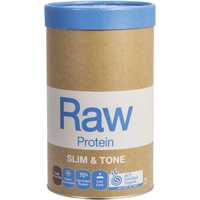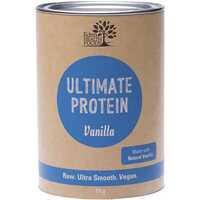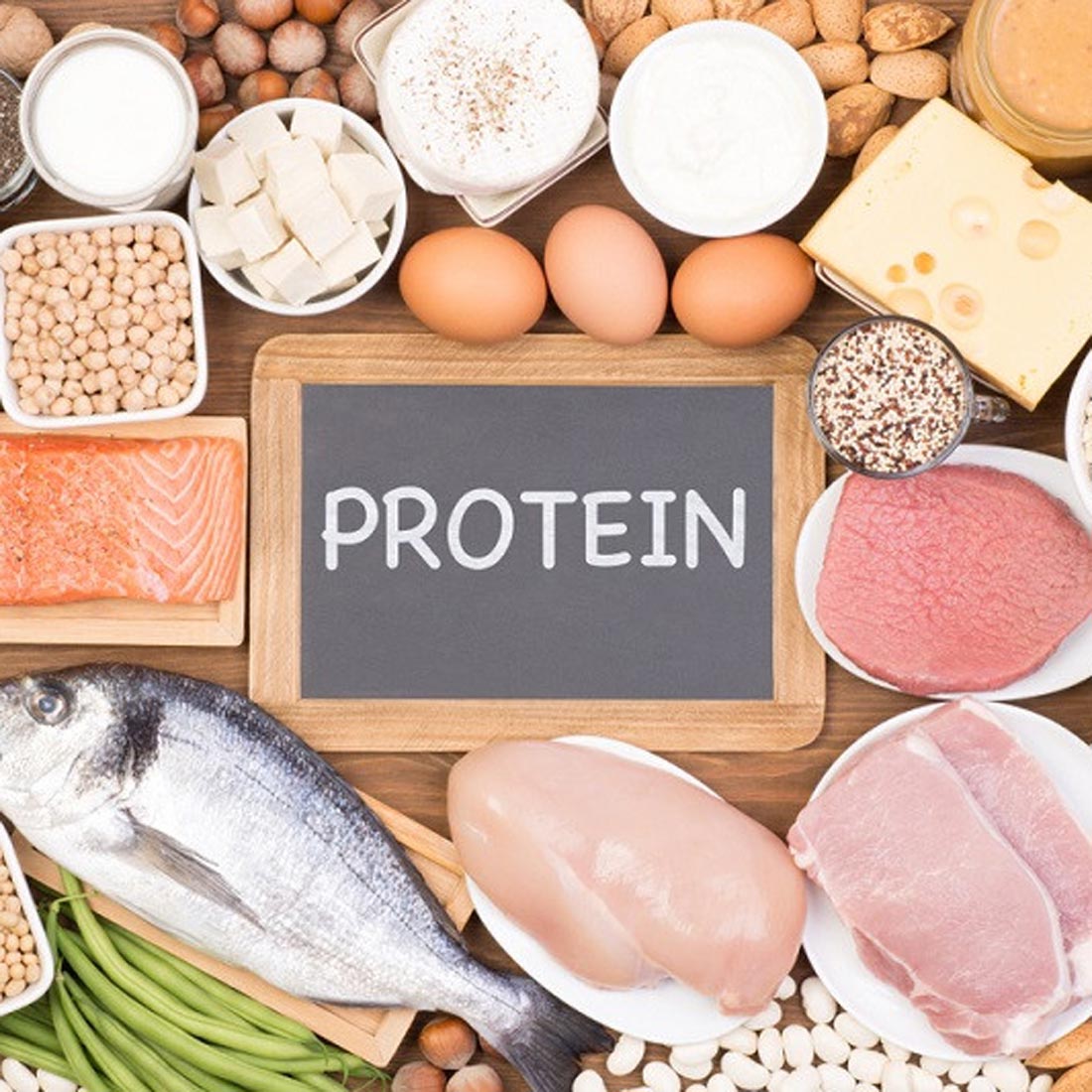From your organs to your muscles, from your bones to your hair, protein is an essential part of human life. There are more than 10,000 different types of protein in the body, with this building block found in every single human cell. Protein plays both a protective and restorative role, fighting off infections and illnesses, and helping to keep your cells fresh and healthy. Once formed, proteins only exist for a certain amount of time. Your daily dietary choices play a significant role in how much protein you have to work with and what you're able to do with it.
What is Protein?
Protein is both an essential nutrient and a large class of molecules dependent on these nutrients. As a basic component of living cells, protein is integral to all aspects of biological function and human life. As a nutrient, it is one of just three major macronutrients, along with fat and carbohydrates. As a class of molecules, there are also three types of proteins: fibrous, globular, and membrane.
Protein has a simple yet flexible structure with the ability to perform a huge array of functions. It consists of carbon, hydrogen, oxygen, and nitrogen, which combine with single or multiple building block chains called amino acids. The sequence of amino acids determines the shape and activity of the protein, with different components folding into unique and specific 3D structures.
What are Amino Acids?
Amino acids are tiny organic compounds used to synthesise proteins and other biomolecules. They function as the backbone for neurotransmitters and hormones, and they are oxidised directly as a source of energy. While roughly 500 amino acids have been found in nature, there are just 20-22 found in the human body. Of these, the following nine are known as essential amino acids because they only come from food: histidine, isoleucine, leucine, lysine, methionine, phenylalanine, threonine, tryptophan, and valine.
It's important to note that you don’t store amino acids. You can either make them from scratch or modify existing proteins already in your body. Along with these nine essential amino acids, the human body can synthesis roughly 10, some of them on a conditional basis based on physiological conditions. Nutritional sources of protein are either complete or incomplete. The complete versions contain all essential amino acids. Meat and other animal products are complete proteins, as are some select plant sources such as hemp, soy, and quinoa.
What Role Does Protein Play?
Protein plays an integral role throughout the human body. It helps to transport molecules, repair cells, and promote physical development during all ages of life. It plays a critical role in how you make energy, move oxygen around your body, and keep your muscles, bones, and tissues in healthy condition. While protein is present in every body cell, as mentioned above, it also needs to be present in your diet.
Protein plays a role in the following key bodily processes:
Growth, Repair, and Energy
Various proteins are needed to repair tissues and promote cell growth, especially if you're sick, pregnant, or recovering from an injury. Protein is both a building block and a fuel, with the age, health, and physiological environment of the individual influencing whether it goes towards growth, repair, or energy. A high protein intake is capable of boosting your metabolism and aiding with weight loss under certain conditions. While protein won't give you as much energy as fats or carbs, it helps you feel full and is capable of building your body as well as providing fuel.
Physical Structure
Proteins build structure throughout the body, offering elasticity and integrity to your bones, skin, hair, and nails. Some proteins include keratin, collagen, and elastin, which help your cells to expand, contract, and stretch. From your lungs and arteries to your tendons and ligaments, protein helps to provide both structural integrity and operational flexibility. It helps to maintain muscle mass, increase strength, and improve bone health.
Chemical Reactions and Messages
Proteins cause numerous biochemical reactions and also function as chemical messengers. Enzymes are proteins that aid with energy production, digestion, and blood clotting, among other important functions. While all chemical reactions involve messages, some proteins known as hormones involve specific chemical messengers that aid communication between cells, tissues, and organs. Hormones include steroids, amines, and proteins such as insulin, glucagon, hGH, ADH, and ACTH. Proteins and amino acid chains known as polypeptides play an important role in how your body regulates key physiological and psychological functions.
Biological Balance
Like everything else in life, balance is the key to good health and emotional well-being. Protein helps to balance the body in many ways, regulating the mix of acids and bases to modulate the pH scale, as well as the key bodily process to maintain fluid balance in the water and blood. Hemoglobin is a protein that helps to maintain the blood pH, and albumin and globulin are proteins that help to balance your cardiovascular system. None of these functions exists in isolation — the growth potential, structural integrity, and message-making capacity of proteins help to align key bodily systems and processes.
Immune System Health
Your immune system is involved in how you relate to the rest of the world. Proteins help to form antibodies, which fight infection and protect your body from bacteria and viruses. The ability to grow, heal, and move upon the Earth is largely dependent on our ability to combat invading forces, and protein has an incredibly important role to play. The antibodies formed by proteins help to fight off bacteria and viruses in your blood. Whenever the body identifies a foreign invader in your cells, antibodies are released and spread rapidly to protect critical internal systems. Antibodies are proteins, and your immune system would not exist without them.
Transportation and Storage
Proteins help in assisting your body with transportation and storage. Specialised transport proteins move a range of substances in and around your bloodstream, including vitamins, minerals, cholesterol, and oxygen. Hemoglobin is one such protein, which helps to move oxygen from your lungs to the rest of your body. There are also dedicated glucose transport proteins called GLUTs, and specialised cholesterol transport proteins called lipoproteins. In fact, protein transporters are constantly used throughout the body to make sure the right stuff is available at the right times. Proteins also have an important storage capacity, with ferritin helping to store iron, and casein stored in breast milk to help babies grow.
How to Integrate Protein Into Your Diet
According to the National Academy of Medicine, adults need a minimum of 0.8 g of protein for every kilogram of body weight per day. Luckily, there are many ways to include protein in your diet, with some definitely better than others.
Meat — red meat in particular — is often noted as the best source of protein. Meat products contain all essential amino acids in high quantities. Other animal products are also high in protein, including eggs, milk, and cheese.
Meat is not the only way to benefit from the wonders of protein, with some plant sources also including all of the essential amino acids. Hemp is a great source of protein, as is quinoa, buckwheat, soy, and certain grains and beans. Dedicated protein powders and supplements are also highly beneficial when combined with a healthy diet and exercise habits.
At Healthy Being, we believe in the power of protein. So if you're looking for a huge range of healthy, delicious and natural protein powders, we've got you covered with hundreds of products to chose from!


 Certified Organic
Certified Organic Vegan Friendly
Vegan Friendly  Vegetarian
Vegetarian Organic Ingredients
Organic Ingredients Dairy Free
Dairy Free Gluten Free
Gluten Free Keto Friendly
Keto Friendly

































